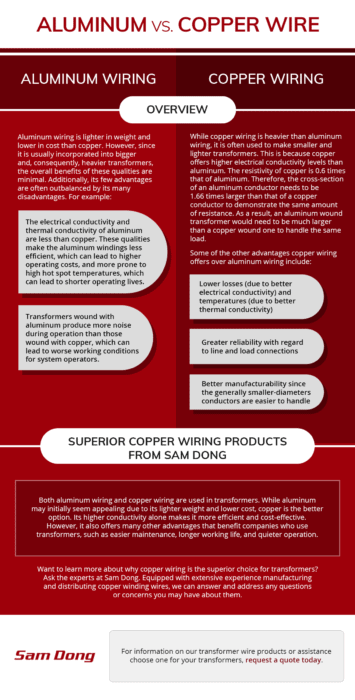Aluminum vs. Copper Wire: Which One Is Right for My Transformer Winding?
Leave a CommentAt Sam Dong, we are a domestic producer of high-quality oxygen-free, high conductivity (OFHC) and electrolytic tough pitch (ETP) copper wires. These materials find application in a wide range of magnetic product applications, including as winding wires in transformers.
Winding wire—also referred to as magnetic wire or enameled round wire—refers to wire coated with a thin layer of insulation and wound into a coil. It is a key component in transformers and other magnetic equipment (e.g., inductors and motors). While many transformers utilize copper windings, some use aluminum ones. Below, we provide a comparison between the two to serve as a helpful guide for readers that needs assistance choosing the one that is best for their needs.
Overview of Aluminum Wiring
Aluminum wiring is lighter in weight and lower in cost than copper. However, since it is usually incorporated into bigger and, consequently, heavier transformers, the overall benefits of these qualities are minimal. Additionally, its few advantages are often outbalanced by its many disadvantages. For example:
- The electrical conductivity and thermal conductivity of aluminum are less than copper. These qualities make the aluminum windings less efficient, which can lead to higher operating costs, and more prone to high hot spot temperatures, which can lead to shorter operating lives.
- Transformers wound with aluminum produce more noise during operation than those wound with copper, which can lead to worse working conditions for system operators.
Overview of Copper Wiring
While copper wiring is heavier than aluminum wiring, it is often used to make smaller and lighter transformers. This is because copper offers higher electrical conductivity levels than aluminum. The resistivity of copper is 0.6 times that of aluminum. Therefore, the cross-section of an aluminum conductor needs to be 1.66 times larger than that of a copper conductor to demonstrate the same amount of resistance. As a result, an aluminum wound transformer would need to be much larger than a copper wound one to handle the same load.
Some of the other advantages copper wiring offers over aluminum wiring include:
- Lower losses (due to better electrical conductivity) and temperatures (due to better thermal conductivity)
- Greater reliability with regard to line and load connections
- Better manufacturability since the generally smaller-diameters conductors are easier to handle
Superior Copper Wiring Products From Sam Dong
Both aluminum wiring and copper wiring are used in transformers. While aluminum may initially seem appealing due to its lighter weight and lower cost, copper is the better option. Its higher conductivity alone makes it more efficient and cost-effective. However, it also offers many other advantages that benefit companies who use transformers, such as easier maintenance, longer working life, and quieter operation.
Want to learn more about why copper wiring is the superior choice for transformers? Ask the experts at Sam Dong. Equipped with extensive experience manufacturing and distributing copper winding wires, we can answer and address any questions or concerns you may have about them. For information on our transformer wire products or assistance choose one for your transformers, request a quote today.
